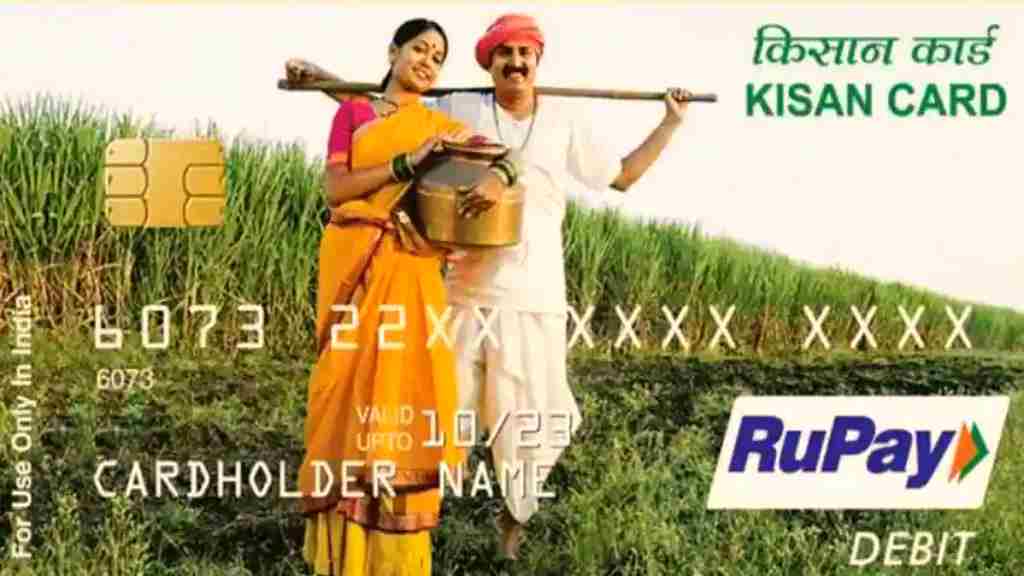Kisan Credit Card (KCC) is a credit plan created by the Government of India in 1998 for farmers. The KCC scheme’s goal is to give farmers timely and sufficient credit support for their agricultural endeavours, including as farming, animal husbandry, fisheries, and other associated industries.
Farmers can obtain finance in the form of a revolving credit line under the KCC system. The card functions similarly to a debit card, allowing the farmer to withdraw the necessary sum of money whenever necessary.

All public sector banks, regional rural banks (RRBs), and cooperative banks all issue KCCs. Under the KCC plan, farmers are eligible for loan up to Rs. 3 lakhs. The interest rate on the credit is typically between 7% and 8% annually, which is lower than the interest rate on other agricultural loans.
Farmers may easily obtain finance, have flexible repayment choices, and pay cheaper interest rates thanks to the KCC plan. It also enables farmers to lessen their dependent on moneylenders and other informal sources of financing. The programme has been effective in reaching out to a sizable number of farmers in India, and it has considerably aided in the expansion of the nation’s agricultural industry.
Features and Benefits of Kisan Credit Card:
The Kisan Credit Card (KCC) system provides farmers with numerous features and benefits, including:
Credit is easily accessible: The KCC plan gives farmers simple access to credit that may be utilised for a variety of agricultural operations such as farming, animal husbandry, fisheries, and other connected businesses.
Flexible repayment options: The KCC loan payback is flexible, and farmers can return the loan at their leisure, based on their cash flows.
Reduced interest rates: The KCC loan has a lower interest rate than other agricultural loans, often ranging from 7% to 8% each year.
Credit limit: Under the KCC system, farmers can obtain loan of up to Rs. 3 lakhs, which can be changed dependent on the farmer’s creditworthiness.
Farmers have access to a revolving credit facility through the KCC system, which allows them to receive cash whenever they need them and return them when they have excess funds.
Insurance coverage: The KCC system includes crop, animal, and other agricultural asset insurance, which can protect farmers from financial losses caused by natural catastrophes, pests, or illnesses.
Subsidies: The KCC plan offers farmers with subsidies for a variety of agricultural operations, including the purchase of seeds, fertilisers, and other inputs.
Ultimately, the Kisan Credit Card plan is intended to give farmers with financial aid, enhance their access to credit, and encourage the expansion of India’s agriculture industry.
Who can apply for Kisan Credit Card:
Individual farmers, joint cultivators, sharecroppers, and tenant farmers are all eligible for the Kisan Credit Card (KCC) scheme. The qualifying criteria for KCC may differ significantly between banks, however in general, the following prerequisites must be met:
- The candidate must be an Indian citizen who is involved in agricultural operations.
- The applicant must have a record of land ownership or landholding for agricultural purposes.
- Joint borrowers, such as tenant farmers, sharecroppers, and oral lessees, are also able to apply for KCC.
- Farmers’ self-help groups (SHGs) or joint liability groups (JLGs) can also apply for KCC.
- The applicant must not owe any money to any financial institution.
- A strong credit history is required of the candidate.
- If appropriate, the applicant must have an acceptable payback history.
Farmers can apply for KCC at any bank that participates in the programme, which includes public sector banks, regional rural banks (RRBs), and cooperative banks. The application procedure is straightforward, and the needed paperwork may include proof of land ownership, identification proof, address proof, and other pertinent documents as determined by the bank.
From where we receive Kisan credit card:
The Kisan Credit Card (KCC) is available from any bank that participates in the system. All public sector banks, regional rural banks (RRBs), and cooperative banks in India issue KCCs. Farmers can apply for a KCC at any of these banks’ local branch.
To apply for a KCC, farmers need to fill out the application form and submit it together with the needed papers, such as evidence of land ownership, identification proof, address proof, and other essential documents as per the bank’s criteria. When the farmer submits the application, the bank will review the documentation and eligibility conditions and, if accepted, will issue a KCC.
The KCC is often issued as a plastic card, similar to a debit card, with the farmer’s name, portrait, and other information written on it. The KCC card may be used to withdraw money from ATMs, purchase agricultural inputs, and cover other agriculture-related expenditures.
Important document for Kisan credit card:
Farmers must submit some key documentation to the bank in order to apply for a Kisan Credit Card (KCC). The paperwork necessary may differ significantly between banks, however in general, the following documents are required:
- Land records, leasing agreements, rent receipts, and any other document establishing the farmer’s ownership or landholding for agricultural purposes are examples of proof of land ownership.
- Identification papers may include Aadhar cards, PAN cards, voter ID cards, driving licences, or any other government-issued picture ID.
- Address evidence can be any document that proves the farmer’s present residence, such as an Aadhaar card, passport, power bill, telephone bill, or any other document.
- Passport size pictures: A few passport size photographs of the farmer may be required to be included with the KCC application form.
- Additional important papers: Farmers may be required to produce other relevant documents, such as income tax returns, crop information, bank statements, and other documents connected to their agricultural business, depending on the bank’s requirements.
It is crucial to note that the needed documentation may differ between banks, therefore farmers should consult the bank’s rules before applying for a KCC.